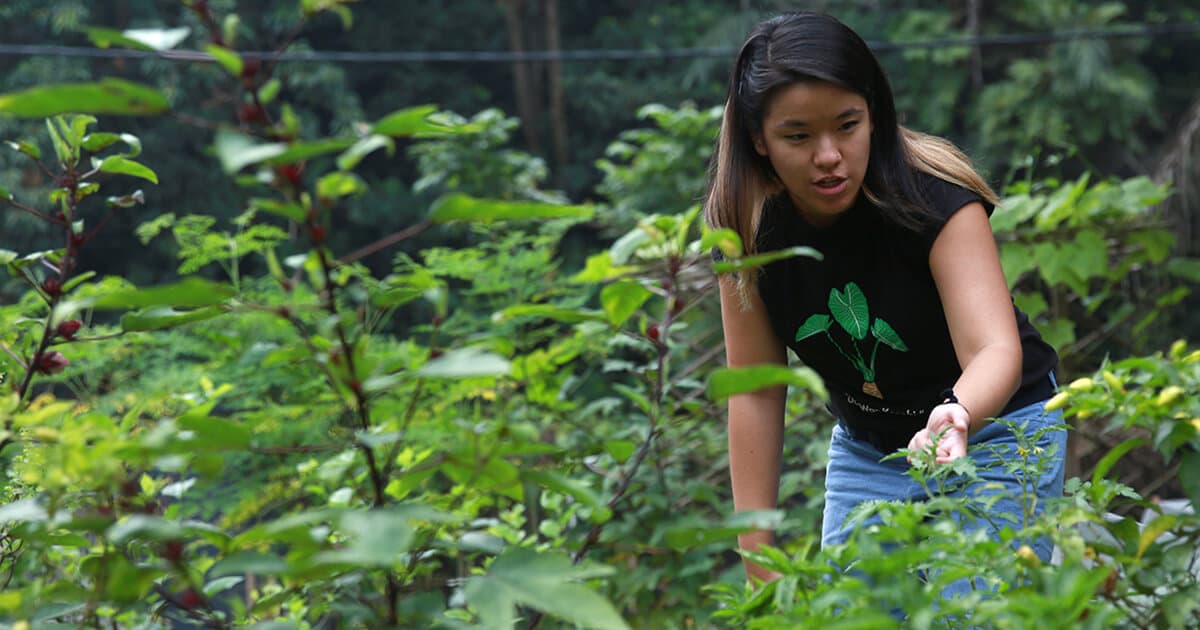
It is a known fact that city folk know very little about urban agriculture and permaculture. It was the same for 34-year-old Low Shao-Lyn before she co-founded Eat, Shoots and Roots (ESR). "One day, I went to my friend's place in Batu Arang and I tried to identify certain plants but I couldn't. 'How could this be?' I thought. That was when I felt it was important for me to learn about plants," she recounts.
ESR's intention was to bring urban communities closer to nature by getting households to grow their own food. With a small capital, the pair rented a quaint single-storey bungalow in Section 5, Petaling Jaya, to start their business.
ESR was set up as an educational hub where they ran workshops and brought in teachers from overseas to instruct students on urban agriculture and permaculture. "We try to get teachers to come and share with us and everyone else their expertise in the hope that people will understand the environment better. When people get their hands dirty, they understand how it all works and, hopefully, that will make a difference to the environment," explains Low.
Preserving the environment has always been ESR's core mission, she adds, and getting people to nurture edible gardens was the means to that end.
It was not an easy journey. A lot of people believed that they were wasting their time. "We were young and naïve, so we did it anyway. At the time in 2013, the social entrepreneurship landscape was booming and we got sucked into the systemic growth, which helped," says Low.
A ray of hope came about when ESR took part in The Arthur Guinness Fund-British Council Social Enterprise Award 2013 and won business training as well as start-up capital. This aided their operation and they built a garden and constructed more plant beds for workshops.
"Until today, people still say we're wasting our time but we are still around. The main challenge is that other people can't see our vision. Although we started out as a big experiment, we felt very strongly about it and went for it."
Essentially, ESR helps people set up edible gardens and conducts workshops on urban agriculture for children and adults. It also sells merchandise and tools to set up edible gardens on its website as well as at a few retail outlets. It also launched a Montessori kindergarten called Rimbun in January this year, where the children are taught to be one with nature.
The company outgrew its space in Section 5 and today, it operates out of a three-storey house in Bukit Damansara. This was part of its expansion plan, says Low. "The PJ space was small and our workshops were limited. It was also getting hard to manoeuvre the beds and start new ones. We also wanted to include a Montessori preschool, which is why we had to look for a bigger space."
Another challenge they faced was communication. With a small team of seven people and the nature of the work at ESR being usually outdoors, most of the time no one was at the office. This meant that if anyone called their phone line, it went unanswered most of the time. "Our customer response was slow and it took us a couple of days to get back to someone but at the same time, we always had our mobile phones with us," Low says.
She was then introduced to Maxis' ONEBusiness Smart plan, which was an all-in-one, mobile and fibre internet package that came with free smartphones and business solutions. Low then signed up for the ONEBusiness Voice Go, which enables the staff in the company to receive calls on their mobile phones.
The hotline works like this: ESR is given a business phone number that it can publish on its public sites. Then, on the back end, the mobile numbers of the seven staff members are registered under the hotline, enabling them to receive calls if anyone called the public number. All the phones will ring simultaneously when a call comes through and the ringing stops when any one person picks up the call. Up to five lines can be assigned under the ONEBusiness Voice Go.
"It's not just about getting calls from new customers but the existing ones as well when they have issues with their gardens. Now, we are easily reachable," says Low.
Internet connectivity is also important, considering that ESR's operational systems and documents are stored on the cloud they need a fibre that is fast, stable and always-on. Low says ESR uses ONEBusiness Fibre in its office because of it has a wireless backup so that the internet is always on. And for its mobile phones the seven-member team have unlimited mobile data during working hours on ONEBusiness Smart, so they can always be in touch with each other and their clients.
"Most of our business systems are on the cloud and we want to have access to them anywhere at any time. That is how we manage our overall business," says Low. "Although our business seems tactile, in this day and age, things like connectivity and data are very important to us because we need to communicate with each other as well as with our customers."

— Claire Featherstone, Head of Maxis Enterprise Practices